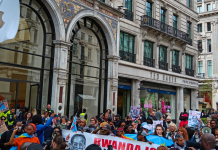Ian Allinson gives a second update on Unite Policy Conference which took major decisions on migration, partnership, industrial strategy, industrial action and the Trade Union Act 2016, backing Jeremy Corbyn, backing mandatory re-selection of MPs, fracking and climate change. Our first update focused on the Trident debate.

Both Jeremy Corbyn and John McDonnell addressed the conference. Their speeches are available on the Unite YouTube channel. Both received enthusiastic and overwhelming support. They pledged renationalisation of railways, repeal of the Trade Union Act and much more. Conference agreed motions pledging the union’s support for Corbyn in the leadership contest. More significantly, conference, with Executive support, backed a motion calling for mandatory reselection of MPs and the return of decision-making to the party conference.
Mandatory reselection would mean that MPs would need the endorsement of their Constituency Labour Party in order to stand again, rather than, in many safe seats, having a job for life. The move puts much more pressure on Labour MPs to respect the decision of members in the leadership election, and may mean some of the worst MPs being replaced.
The debate on the EU ended with conference backing Executive Statement 2, which opposed racism. However, this meant that emergency motions which gave stronger support for migrants fell. Speakers for the motions defending freedom of movement argued that accepting failing to do so meant accepting the idea that too many migrants or the wrong sort of migrants was a problem. Restrictions on our freedom of movement don’t stop people moving, they just make migrants more vulnerable and precarious by denying them rights. Fudging this argument makes it harder to organise migrant workers and build the strong union we need to tackle the real causes of our problems. The EC Statement committed the union to a debate on freedom of movement. This is an opportunity to carry the arguments against anti-migrant racism and for freedom of movement throughout the union.
On behalf of conference, Len McCluskey sent a message of support and solidarity to the strikers at Fawley oil refinery. Len’s intervention avoided the British Jobs For British Workers angle and clearly put the blame on the employers who are paying migrant workers far below the rate of most on the site. Unfortunately a lot of the media coverage has taken the lead from the poorly titled press release and doesn’t reflect Unite’s aim of all workers being paid properly irrespective of nationality.
Conference later passed Composite 19 which dealt with the Immigration Act 2016. This called for a regularisation programme for undocumented workers and to campaign against ordinary citizens being asked to act as border guards.
Motion 135 on “partnership” wasn’t just about so-called “partnership agreements”, but about the ideology that members and their employers are “all in it together” that is so rife within the union. Such ideas had been apparent throughout conference, and were strongly tied to the current of nationalism particularly evident in the debate on manufacturing strategy. The motion committed the union to oppose partnership through reps’ training, a toolkit and through the union’s organising strategy.
Sharon Graham, the head of organising, gave a presentation on Unite’s “Work – Voice – Pay” industrial strategy. Unite has built a database, accessible to all reps, covering tens of thousands of workplaces. It provides details of agreements and is intended to allow reps to coordinate bargaining more effectively. Work-Voice-Pay is intended to provide a consistent framework for campaigning across workplaces and industries. Template agreements and guides are gradually being built up. Unite is aiming for every workplace to be “strike ready” in case members find themselves in a position of needing to take action.
Composites 33 and 34 dealt with industrial action and the Trade Union Act 2016. Both were passed with the support of the Unite leadership. Unite will be setting up regional and national Disputes Units; training reps and officers in how to run disputes, including direct action training; and using a rapid reaction strategy if any activist is disciplined or dismissed for union activity. Composite 34 committed Unite to support unions that may find themselves outside the law and endorsed Len McCluskey’s statement that if defending members “means taking us outside the law then so be it”.
Conference supported Composite 16 which asked for Unite to campaign for the renationalisation of public utilities. The delegate seconding the motion argued that we could solve the energy crisis in Britain by campaigning for the development of energy renewables now. Britain has one of the best coastlines in Europe for the development of existing wave power technologies. It was pointed out that conference had passed an executive statement on Trident that gave a strong commitment to defence diversification. It’s possible now to transfer the skills of those building nuclear submarines in Barrow and frigates on the Clyde to building wave power stations. Unite could be working with the Labour Party and putting pressure on the Scottish government to put into action their commitments to developing energy renewables.
Conference agreed Composites 17 on fracking and 18 on climate change. Unite’s opposition to fracking is now extended to cover all unconventional gas extraction, including Underground Coal Gasification and Coal Bed Methane extraction. Composite 18 covered more than two pages – it included a commitment to pursue the One Million Climate Jobs campaign and distribute the excellent pamphlet, work for “just transition” and back a Climate Diversification Agency.
Ian has been posting details of the conference decisions on www.iansunitesite.org.uk. The leaflets rs21 members have been distributing at conference are available on our Resources page.
















